LINZ EUROPE TOUR 2007-2009
World musician on a cruise
Hubert von Goisern docks for a fantastic show
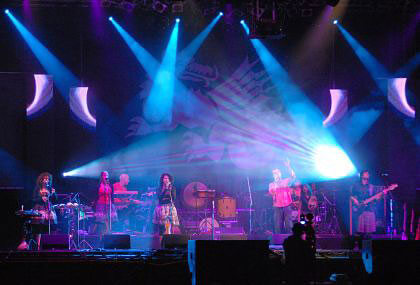 On
Sunday Hubert von Goisern's floating village will be unloading its musical
cargo one last time. In Passau a two year and many thousand kilometres-long
concert journey will come to and end, a journey on which the Austrian
world musician added a stop at short notice at the Lände in Hilpoltstein.
A stroke of luck for the town as the fans had the pleasure of a fantastic
show.
On
Sunday Hubert von Goisern's floating village will be unloading its musical
cargo one last time. In Passau a two year and many thousand kilometres-long
concert journey will come to and end, a journey on which the Austrian
world musician added a stop at short notice at the Lände in Hilpoltstein.
A stroke of luck for the town as the fans had the pleasure of a fantastic
show.
Hilpoltstein - There is a little wistfulness when Goisern muses on the approaching end of his Linz Europe Tour. "In three weeks it will all be over and we won't be back here," he says at the end of the almost three hour concert with a touch of melancholy. The impressive stage on the 77 metre long barge is soon to be dismantled, then the ship convoy will be once more used for transporting ballast and gravel.
But first of all Captain von Goisern takes the 1600 spectators at the dock in Heuberg with him on a cruise as diverse as it is relaxed through many different regions of world music. Africa, Asia, South America and now Eastern Europe too - the world musician incorporates every possible element into his compositions; the 55 year old Austrian jumped out of the pigeonhole of alpine rock long before his Danube ship expedition to the Black Sea.
And after a good two years and more than 50 concerts Hubert von Goisern has an excellent lineup at his command. The eight piece band plays flawlessly, the captain granting each of them sufficient freedom. In Hilpoltstein there are no guests such as the local musicians at the stops in Eastern Europe, or Konstantin Wecker in Nuremberg at the end of July on board, but this does the atmosphere no harm at all. The fact that this concert was organised in just four weeks was never noticeable.
An impressive light show with atmospheric videos is partly responsible, as well as the beautifully mixed sound in particular. One is often maltreated with a hopelessly overdriven soup of sound at open air concerts, but Goisern's floating concert hall shines with a finely balanced acoustic. The arena on the Lände becomes a wellness oasis, as rather stately pieces dominate for stretches.
But before it becomes too relaxed in view of the concentrated melodiousness Goisern and Co. accelerate again. With harmonica, Styrian accordion and wild guitar-violin duels things get going to power polka mixed with Irish folk; funk and gypsy jazz, reggae and time and again in between exuberant yodels and juchitzers waft over the heights of Heuberg and during the encore the everlasting Hiatamadl comes along again, this time as an unplugged version, and the ever gorgeous Heast as nit.
In between the Goisern shows himself to be a talker with deeper meaning, telling of his meetings with people in Eastern Europe, with whom "at least" we are united by our mutual fear of each other says the musical bridge-builder. People in the rich industrial countries fear for their prosperity and the poor are afraid that they will lose the shirts off their backs in the course of the EU's eastwards expansion.
But at least the Goisern concert in Eastern Europe were free and were partly "subsidised" by the ticket sales in Germany. And even the biggest EU sceptic would gladly spend a Euro for such a beautiful summer evening.
Hubert von Goisern: Live in Passau - 31st August 2008

Hubert von Goisern: Live in Passau - 31st August 2008
Photo: © Elli Christl
Hubert von Goisern: Live in Passau - 31st August 2008
Photo: © Elli Christl
Hubert von Goisern: Live in Passau - 31st August 2008
Photo: © Elli Christl
Hubert von Goisern: Live in Passau - 31st August 2008
Photo: © Elli Christl
Hubert von Goisern: Live in Passau - 31st August 2008
Photo: © Elli Christl
Hubert von Goisern: Live in Passau - 31st August 2008
Photo: © Elli Christl
Hubert von Goisern: Live in Passau - 31st August 2008
Photo: © Elli Christl
Hubert von Goisern: Live in Passau - 31st August 2008
Photo: © Elli Christl
Hubert von Goisern: Live in Passau - 31st August 2008
Photo: © Elli Christl
Hubert von Goisern: Live in Passau - 31st August 2008
Photo: © Elli ChristlThe ship returns home

Linz, 1st September 2008, 15.00 hrs. As the Linz Europe Tour 2007-2009 concert ship returns home Hubert von Goisern and his band play a last encore for people along the Donaulände in Linz.
Cultural messages in the most beautiful of settings
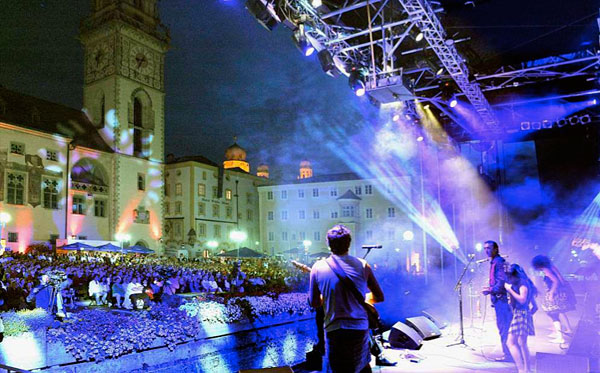
Yesterday Linz promoter Hubert von Goisern boosted Passau a great deal too - 2000 fans on the Rathausplatz
You could almost think that the musical whizz-kid Hubert von Goisern is more a cultural ambassador for Passau than for the Upper Austrian capital Linz, for whom he toured for two years, up and downstream on the Danube, in order to promote Linz as the European Capital of Culture 2009. Yesterday evening more than 2000 fans of the fresh air and Goisern came together in the most beautiful later summer idyll on the Rathausplatz - and there were a few hundred more behind the fences - to listen to the alpine rocker for a good three hours until just before 11pm. He presented rocky and dreamy classics like Hiatamadl, Weit, weit weg and Heast as nit as well as zeitgeist numbers from his new CD S'Nix.
It was the fifth time in four years that the 55 year old world musician had played in Passau - in front of the imposing backdrop of the cathedral, or on the ship's stage before Oberhaus. His three-part stage ship dropped anchor there at midday yesterday for the last time after more than 30 concert and about 80,000 spectators. "That's just the way it is - it makes me cry", said the charismatic songwriter, unmistakably wistfully.
"The circle completes itself here for Hubert", said organiser Till Hofmann. "His Linz Europe Tour started here last year. And now it has ended here too." It was Hubert von Goisern's special request to dock again "at this perfect location" and in so doing promote the cultural city of Passau that is so full of ideas. In 2007 5000 fans came to two concerts in the same place.
"... it makes your head spin"
Hubert von Goisern's "Linz Europe Tour" will
come to an end on Sunday.
With "sadness and relief", as the musician explained during
the SN interview in Hilpoltstein.
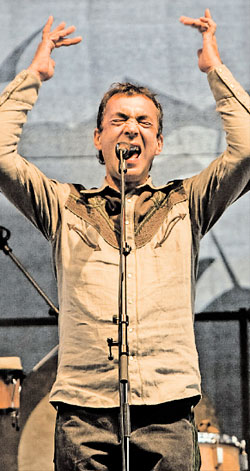 Hilpoltstein,
district of Roth, near Nuremberg. "Historical fortress town on Roth
lake", says the sign at the exit from the Munich-Berlin autobahn.
Middle Franconia. Mittelfranken. Pine forests. Flat land. The Main Danube
Canal cuts through the country. This canal joins - across the European
watershed - the Danube and Rhine, northwest with southeast, Black Sea
with North Sea. In the past two summers Hubert von Goisern, his band
and technical crew have covered about 12,000 kilometres on the water.
60 concerts have been played on the 77 metre long ship convoy converted
to residence and stage.
Hilpoltstein,
district of Roth, near Nuremberg. "Historical fortress town on Roth
lake", says the sign at the exit from the Munich-Berlin autobahn.
Middle Franconia. Mittelfranken. Pine forests. Flat land. The Main Danube
Canal cuts through the country. This canal joins - across the European
watershed - the Danube and Rhine, northwest with southeast, Black Sea
with North Sea. In the past two summers Hubert von Goisern, his band
and technical crew have covered about 12,000 kilometres on the water.
60 concerts have been played on the 77 metre long ship convoy converted
to residence and stage.
Tomorrow, Sunday, the last concert of the Linz Europe Tour will be taking place. In Passau an undertaking will be ending which in the SN two years ago Hubert von Goisern called his "greatest challenge yet" - artistically, organisationally and financially. The costs amount to about four million Euros. "Linz 09" and Red Bull are each contributing a third. The rest he has to raise himself.
On board before the concert in Hilpoltstein on Thursday evening, a mixture of melancholy and a final thirst for action can be felt. It is time to to take stock and tentatively look forward.
How did you come to add in a concert here in Hilpoltstein towards the end of a long tour?
We had planned several buffer days, one of which we used to play at the famous bridge in Arnhem. With Hilpoltstein it also worked out well that my fanclub is based here and so we have a local lobby. That helps with all the many official permissions. It was only three weeks ago that we went public with it and we've sold more tickets that we have so far for the last concert on Sunday in Passau, which was announced three months ago. If it was up to us, we'd play a concert every day, certainly now as the tour is coming to an end. But unfortunately conditions just don't allow it.
Here the water is a canal, a human intervention into nature without any charm. So where were your favourite places on the stretch between Upper Austria and the North Sea?
Oh, it's not really so bad on the canal. It's much nicer to sit on the bow of a ship and glide through Franconia and have little conversations with cyclists, walkers and people fishing as you sail past, than to search for the meaning of life as you race along or sit in a traffic jam on the autobahn. If you, like I, sit at the bow and enjoy the journey and can watch the ducks, swallows and wagtails looking for food and playing, you don't see it as a test. And picking a favourite place is one of those things. On a tour such as this every place has a special attraction because it is unique.
Of course the various end points have a special significance: the Danube delta last year, this year the harbour towns of Amsterdam, Rotterdam and Antwerp. But then alongside that there are the "other ends" too, places where the seven dwarves live in the seven mountains, where you seem to be in the middle of nowhere, like in Obermühl, Hirschhorn, Wanssum or here in Hilpoltstein.
Over the past two years you've lived and worked on a ship for about six months. Another few days and then the Linz Europe Tour will come to an end. What are you feeling as this happens?
Melancholy and relief. However, joy at returning home prevails. It's not just a geographical return. Including planning, everything has been dominated by the water for the past three years, everything was liquefied, water solubility was the deciding factor.
Of course I'm sad that our floating village, which has fulfilled the basic premise of the project so beautifully, that is, forming a platform for encounters two summers long, will now go no further. But who knows what blooms will come from the seeds we have sown across Europe over these summers?
Wherein lies the fundamental fascination in a project like this?
The means of travel - is there anything more noble than travelling by ship? Not for me at least, as I love the water and do not regard travel as a necessary evil.
I look for this nomadic lifestyle, this nomadic sentiment. Because from that develop encounters and meetings. A meeting can only take place if at least one of the participants moves. I have made a move, well, you could say I've moved Austria and with it a piece of Europe, because our ship was a de facto Austrian territory, thus Europe, wherever it moored or sailed.
Time and again there were difficult situations too - brought about by nature and by bureaucracy too. So faced with problems did you think about giving up now and again?
No, I have perhaps sometimes doubted making it work and yes, there were disappointments, but giving up was never a thought. My sense of responsibility towards my partners "Linz 09" and Red Bull, Linz 09 manager Martin Heller and Red Bull owner Dietrich Mateschitz, as well as all my friends and colleagues who have worked with enthusiasm and great trust on putting it all into action would not have allowed it. I would have been more prepared to go under than to jump overboard just to save my own skin.
Last year the journey to the Black Sea was a journey of adventure into unknown regions - for you personally, but for your music too. What else was different this year?
It was a bit easier this year in terms of collaboration. Last year there was more tension and uncertainty on both sides - triggered by language barriers among other things. And everything was new for us too last year. We also had to learn to trust the ship and ourselves.
It was all about socialising artistically. How did that work out?
Well. A huge network has developed - or rather: lots of networks have been connected with each other through this project. Yes, I think I've made a contribution to the chaos, a successful impact on the existing master plan.
You recorded a new version of Hiatamadl with the Moldovan band Zdob și Zdub, who were on board last year. Will other concrete projects develop from other contacts?
Who am I to look into the future? There are ideas, but at this moment I don't want to set to the next thing, but rather let this adventure exhale first.
What is the difference is there between the way music is handled in the east and west?
In the east I noticed an almost sporty virtuosity. We have that here in the west - in jazz for example. But in contrast to here, in the east nearly every village musician plays brass or fiddles in such a way that it makes your head spin. Instead in the west there are more singers who have something to say, and it's more centred on the individual, less on the collective. That's my impression in any case.
You were travelling as an ambassador for "Linz 09". What did the journey bring to the Capital of Culture?
A lot of communication about Linz as "European Capital of Culture 2009". "Linz 09" was a stroke of luck for me, but I was a stroke of luck for "Linz 09" too. It's clear when you take a look at the budgeting. More than two thirds of the financing comes from Red Bull and our own resources.
The finale of this three year project will be a festival next July as part of Linz Capital of Culture 2009. What will one experience there?
Encounters - we want to get all the artists to Linz for a week foster to just that: encounters. It won't be a festival where more or less compatible music sets are played on after the other. It will be a concert lasting several days.
Hubert von Goisern: Live in Kelheim - 29th August 2008
A surprise concert in Kelheim, where the Main Danube
Canal meets the Danube.
Hubert von Goisern and band play for spectators on the shore as the ship
sails along ...

Hubert von Goisern: Live in Kelheim - 29th August 2008
Photo: © Matthew Ulbrich
Hubert von Goisern: Live in Kelheim - 29th August 2008
Photo: © Matthew Ulbrich
Hubert von Goisern: Live in Kelheim - 29th August 2008
Photo: © Matthew Ulbrich
Hubert von Goisern: Live in Kelheim - 29th August 2008
Photo: © Matthew UlbrichAlpenglow on the canal
Alpine fusion rocker Hubert von Goisern has been sailing around Europe for a year on a converted barge giving concerts on the riverbanks. He dropped anchor at the Hilpoltstein mooring point and there he thrilled about 1600 spectators.
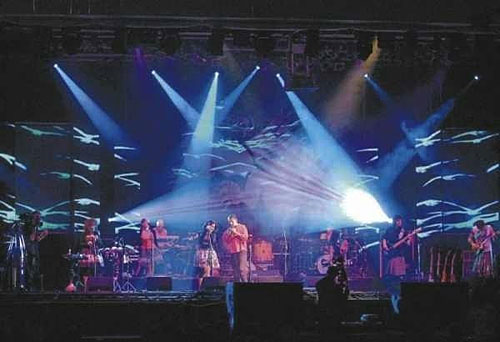
It is the last but one stop on his Linz Europe Tour and von Goisern is starting his show the way he once began his musical career: with the sounds of the accordion. There is also a magical evening sun and a pleasant beer garden atmosphere. Into which suddenly bursts a crashing electric guitar and only a few steel ropes stop it from rocking the concert barge. Then comes Austrian dialect acrobatics - von Goisern raps for all he is worth while his musicians let wild Balkan beats ring out. When the singer entertains with his version of Wildschütz he is in his element: von Goisern runs the yodelling through the mill of rocky rhythms, mixes in sung tongue-twisters and does all this with an ease that implies that this sometimes really adventurous musical mixture is as natural as anything else. His joy in playing and singing is also increased by the fact that "the most important and only fanclub" for the Austrian multitalent is run in Marquardsholz.
Why did they play in Hilpoltstein and not in Marquardsholz? "Because we have more friends here", von Goisern calls from the barge to the crowd, looking to lessen the distance across the water a little. To strengthen the effect he follows with a song about a relationship that lives on its differences. Just like the music of von Goisern, which soon increases in tempo and volume.
To new shores
"I want to live", the alpine rocker roars into the microphone, before reaching for his strongest musical form of expression: yodelling, of which the man is really a master. Whether drawn out and with pathos, or onomatopoeia that tumbles out of his mouth. Here is someone who doesn't make fun of the sounds of the homeland, but, in the truest sense of the word, wants to lead them to new shores.
To the shores of Hilpoltstein for example, where the evening star has now appeared, the stage smoke disperses and von Goisern atmospherically beats on the Chinese gong. Then despite the driving drum rhythms things become philosophical: in the eye of your opponent you see yourself, you hear from the mix of instruments, before alpine primal cries ring through the arena. The sentence "there's nothing that's true that's not a lie too" lets a good many think about what it means until they realise: "rain comes, rain goes - nobody knows, but everyone understands", at least that's what Goisern's three female vocalists sing. Almost imperceptible among all this, a ferry passes the concert barge, a barge that has nearly come to the end of it 12,000 kilometre tour. After Hilpoltstein the barge will dock in Passau and then finally in Linz. A journey on which von Goisern established that Western Europeans have just as sceptical an attitude towards their eastern neighbours as vice versa.
"Our fear of each other unites us", he says with a bit of sarcasm as well as defiant hope, before he musically dives into higher realms, the singing comes out without words and the musical searches for approval in 70s art rock. In the encore however he ends up with Hiatamadl, though he's probably not referring to organiser Ruth Kiefer, who then thanks Thomas Amann from the town authorities, the fire service and the Heuberg sport association for their support.
Where music is the only language
Live from the ship: Hubert von Goisern wows in Lohr am Main
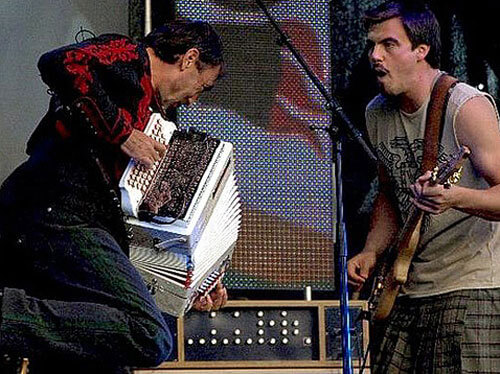
Hubert von Goisern knows no bounds. At least, we haven't seen any limits to the Austrian musician so far. The 55 year old has pushed his musical tours of discovery ever further, indefatigable and full of fervent energy that never seems to extinguish. The audience in Lohr was also witness to the exceptional artist's soul and music culture trip as he once more demonstrates boundlessness with his current tour: travelling from Linz to the North Sea with a floating stage.
And the message that the songwriter and world musician - whose real name is Hubert Achleitner - from the Austrian spa town of Bad Goisern communicates verbally to his fans leaves no open questions. "We humans have such clear boundaries, just with our different languages alone, why not set out some more or hold them up?" he asks the crowd. They are inspired and are caught under the spell of the alpine rocker and his eight member band for a full three hours.
Boundaries. Hubert von Goisern seems to find it laughable that this term even exists. Blues scales on a Turkish gadulka? No problem. Styrian zwiefach rhythms during a hard rock song? One of the easiest exercises. The band excels at the breathtaking rollercoaster ride through seemingly mutually exclusive stylistics without once sounding false. The crystal clear sound that fills the harbour grounds in Lohr helps. But an atmospheric density is essential too, something that the Austrian's music radiates as he sets himself in among his much younger companions without any cult of personality.
Hubert von Goisern is what you would call a real bandleader, just like - to set the bar really high - Miles Davis once was, or, to come back down to earth and stay in the here and now, in the German-speaking lands Hans-Jürgen Buchner of Haindling perhaps is: a musician who has an excellent band and gives his accompanying musicians sufficient room to develop, but keeps control himself without playing the stage dictator.
A journey through the world musician's published creativity over the last 20 years becomes a real exhibition: plucked bass runs from subwoofer Helmut Schartlmüller, jazzy lead sounds from guitarist Severin Trogbacher and wicked synth cascades and alternately beautiful analogue-sounding Fender Rhodes sounds from keyboarder David Lackner. They are joined by the three extremely appealing to look at background singers Maria Moling, Elisabeth Schuen and Marlene Schuen, who apart from the optic and their voices each have another instrument to offer. With this arsenal of top musicians, a modern LED stage and filigree sound engineering, they strike up.
The Austrian Capital of Culture Linz saw this too, for whom Hubert von Goisern is on the river tour for three years. He started from here on the Danube and set off eastwards with a barge converted to a floating concert stage, exploring numerous towns and cities on his journey to the Black Sea delta.
He always takes on board musical representatives of the different regions. In 2009 the finale festival of the expedition will take place in the summer in Linz. An amazing project for an music-mad man.
It is this image that the 55 year old portrays during his show, with deep creases in his brow and yodelling vocal acrobatics, when he for example squeezes the slow blues Fön from himself with the trumpet and voice, plays the accordion like a dervish, or strikes up with a "performance of duty" in the shape of the actually atypical, but defining hit Hiatamadl.
He exudes so authentically the way you imagine a Styrian mountain brook in the morning to be. The rural roots of the dialect-speaker and homeland advocate become one with the variety of sounds and different possible combinations that suddenly seem so natural.
Now the every last listener feels, not in their head, but in their stomach, that a language without borders is being spoken here. It is pure music and emotion. Without any posing behaviour, without distracting megalomania, without cool expressions, without filters, simply without bounds. It's wonderful that something like this still exists today.
The main thing is that you feel it
Plea for the lust for life and music: Hubert von Goisern at the Mainlände
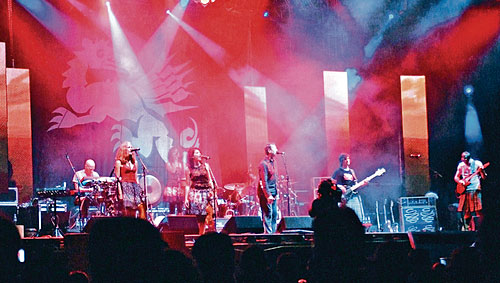
"I bi ån" means something like "I'm fine". But in particular one of Hubert von Goisern's most rousing pieces means that its effect was not lost on Friday at the open air on the Main.
It was still spitting barely an hour before the start of the concert, which is why the audience seemed well wrapped up on the Mainlände - no small number of them with cushions, blankets and folding chairs. But then it cleared up and by the end things had got really hot - musically.
Hubert von Goisern and his band travelled 7000 kilometres on the "Brandner IV" flotilla, down the Danube to the Black Sea, giving free concerts along the way in southeast Europe, often with guest musicians who came on board and travelled part of the journey with them.
The Balkan influences are thus easy to hear in the current programme, not just in the parts where Darinka Tsekova from Sofia contributes quite distinctive sounds on the traditional gadulka, a stringed instrument as big as a gourd.
And yet you don't hear any break from the older pieces: Hubert von Goisern has always worked very different sounds and patterns into his music. The fact that time and again pieces arise that are as new and unheard as they are accessible proves that the cliché of music being a universal language is in fact no cliché at all.
How he does it is difficult to say, but Hubert von Goisern has the gift for communicating simple messages with great depth. On his explorations of Bulgaria and Romania he discovered that the people there are as afraid of the EU as Central Europeans are of their southeastern European neighbours. "So there we have the smallest common denominator", he says, "the fear of each other."
But Hubert von Goisern is no notorious man of reason between nations. He pleads for the lust for life and music: You don't need to understand it, the main thing is that you feel it. What language means: I don't understand Franconian either," he calls to the fans in front of the stage, who evidently constantly want to hear the old numbers. And then they get them. Barely a hit is missing, be it Hiatamadl, Weit weit weg, Juchitzer, Poika or even I bi ån.
The audience says thank you with joyful recognition and keenly sing along. Even the Goiserer is impressed with how accurately they deal with the not exactly uncomplicated lyrics of Hiatamadl. And at the end, after three hours almost without a break, there is likely nobody who wouldn't say, "i bi ån".
